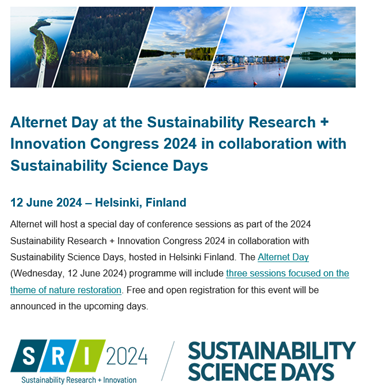
Alternet is looking for members of the Alternet community to contribute to the Alternet Day sessions at the at the Sustainability Research + Innovation Congress 2024, to be held on June 12th 2024, in Helsinki (Finland). This can include speakers giving traditional talks, interactive presentations, participatory workshops, or more.
These sessions include the following:
- Science-policy interface supporting nature restoration: With the mounting evidence of ecosystem degradation causing biodiversity loss, a call to turn negative trends to positive has resulted in important science-policy challenges. The EU Nature Restoration Law proposal resulted in a debate which came close to gridlock in 2023. However, the European Parliament has now voted for the law to go forward after several compromises to the original Commission proposal, in particular, regarding the role of agricultural lands and peatlands. By the time of the SRI conference in June 2024, the Nature Restoration Law should be passed and will provide a timely target for analyses. Presentations investigating how the process of preparing the EU Nature Restoration law relied on existing knowledge about biodiversity restoration and on pre-existing knowledge-platforms and knowledge streams are encouraged. What does this mean for future knowledge needs, including but not limited to monitoring and evaluation processes?
In addition to presentation proposals and speaker nominations, Alternet members can provide presentations/content which will showcase the kinds of work being done across the network, potentially including Eklipse and European projects. - Ecosystem restoration for increased biodiversity and multiple ecosystem benefits: Approaches to restoring different ecosystem types and their functions depend on both the legacies of human activities which have resulted in ecosystem degradation and the restoration objectives. For example; wetlands have been restored to improve nutrient retention, agricultural lands to manage drought risks and increase fertility, forest ecosystems to generate habitat for species relying on old-growth characteristics and reduce pest and drought risks or peatlands have been restored for climate change mitigation as well as water retention and purification. Alongside these primary justifications, numerous other ecological, social and economic benefits have been identified as motivating restoration. Restoration helps to tackle the triple planetary crises crisis: biodiversity, climate and pollution. Nexus-approaches seek to maximize synergies and minimize tradeoffs in addressing these crises and generate policy coherence. This sessions calls for presentations including “examples of good praxes” which help to provide a knowledge-base for the effectiveness of different restoration approaches and the extent to which they are optimised for the production of multiple ecosystem benefits.
In addition to presentation proposals and speaker nominations, Alternet members can provide presentations/content which will showcase the work with younger scientists, in particular the summer school as well as welcoming presentations from alumni. - Governance of nature restoration: Restoration approaches range from active manipulation of ecosystems, e.g., with excavators and shovels to reductions in active management such as grazing. Coordinating and implementing such a range of actions requires changes to the current management practices and to the rights and responsibilities of different actors implementing or affected by them. Restoration may, for example, be publicly funded or carried out by NGO, citizen groups and/or funded or financed by private businesses, for a variety of motivations, ranging from reducing supply chain risk through to corporate social responsibility. This entails novel and diverse combinations of actors in teams working for restoration, each with different resources, interests, and accountabilities. These new mixes should in the long-term strengthen restoration but also highlight tensions: for example, how to fairly balance the needs of local citizens with those of corporate actors? This must be planned for both within restoration teams, and by other actors who govern it. These range from information and planning to regulation and incentives. This session calls for presentations that share different approaches to governance of restoration, the need for engagement with local stakeholders, and the learnings around the effectiveness, feasibility and legitimacy of these approaches.
In addition to presentation proposals and speaker nominations, Alternet members can provide presentations/content which showcase examples of Alternet’s work within European projects (such as BioAgora), focusing on the role of Alternet and how being a part of it brings value to organisations involved.
Are you interested in serving as a speaker, or do you have a colleague you would nominate? Alternet asks any prospective speakers and session contributors to fill out the following speaker/presentation proposal form for the 2024 Alternet Day – deadline: 1 March 2024 – or reach out directly to: secretariat@alterneteurope.eu.